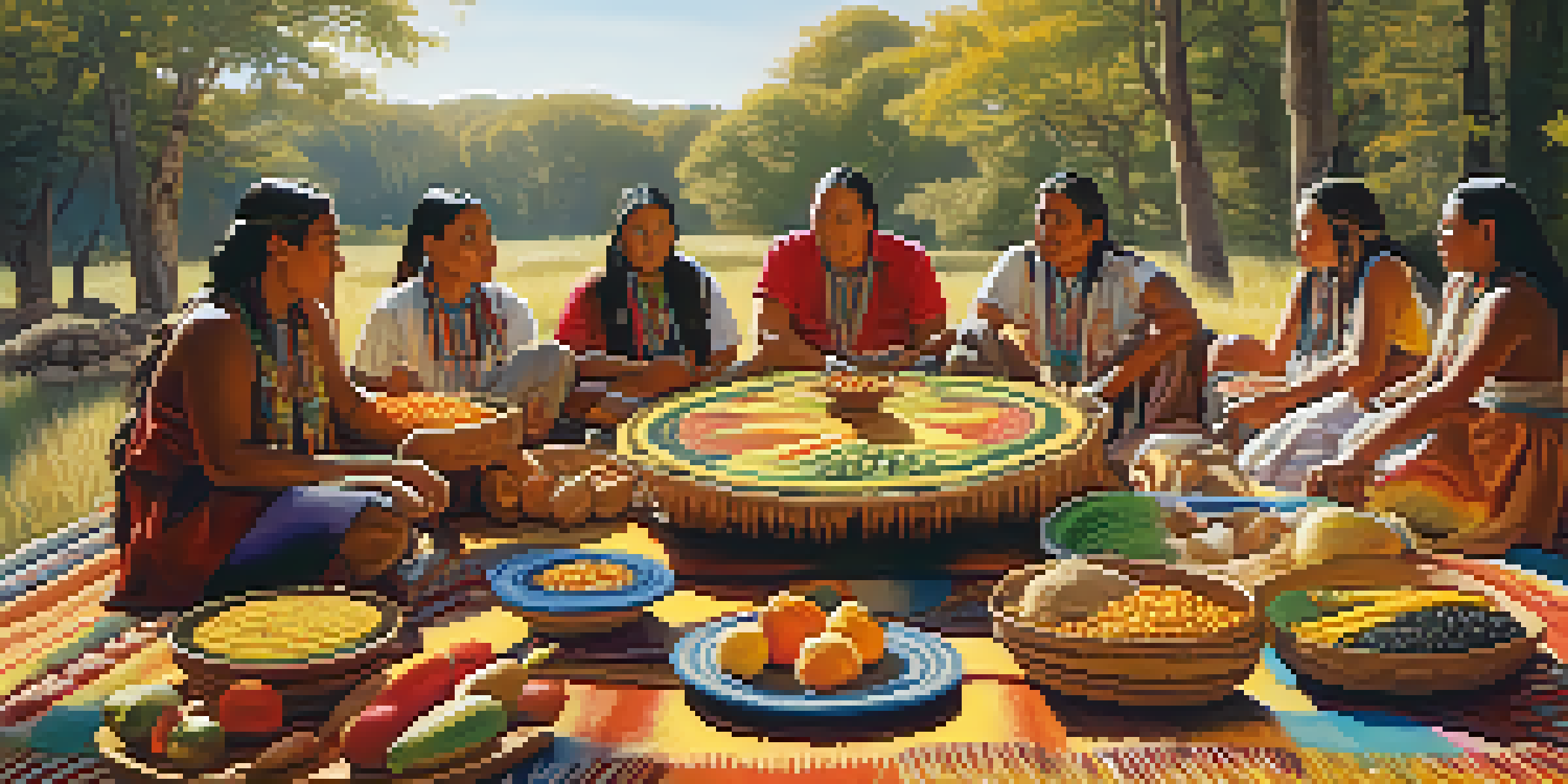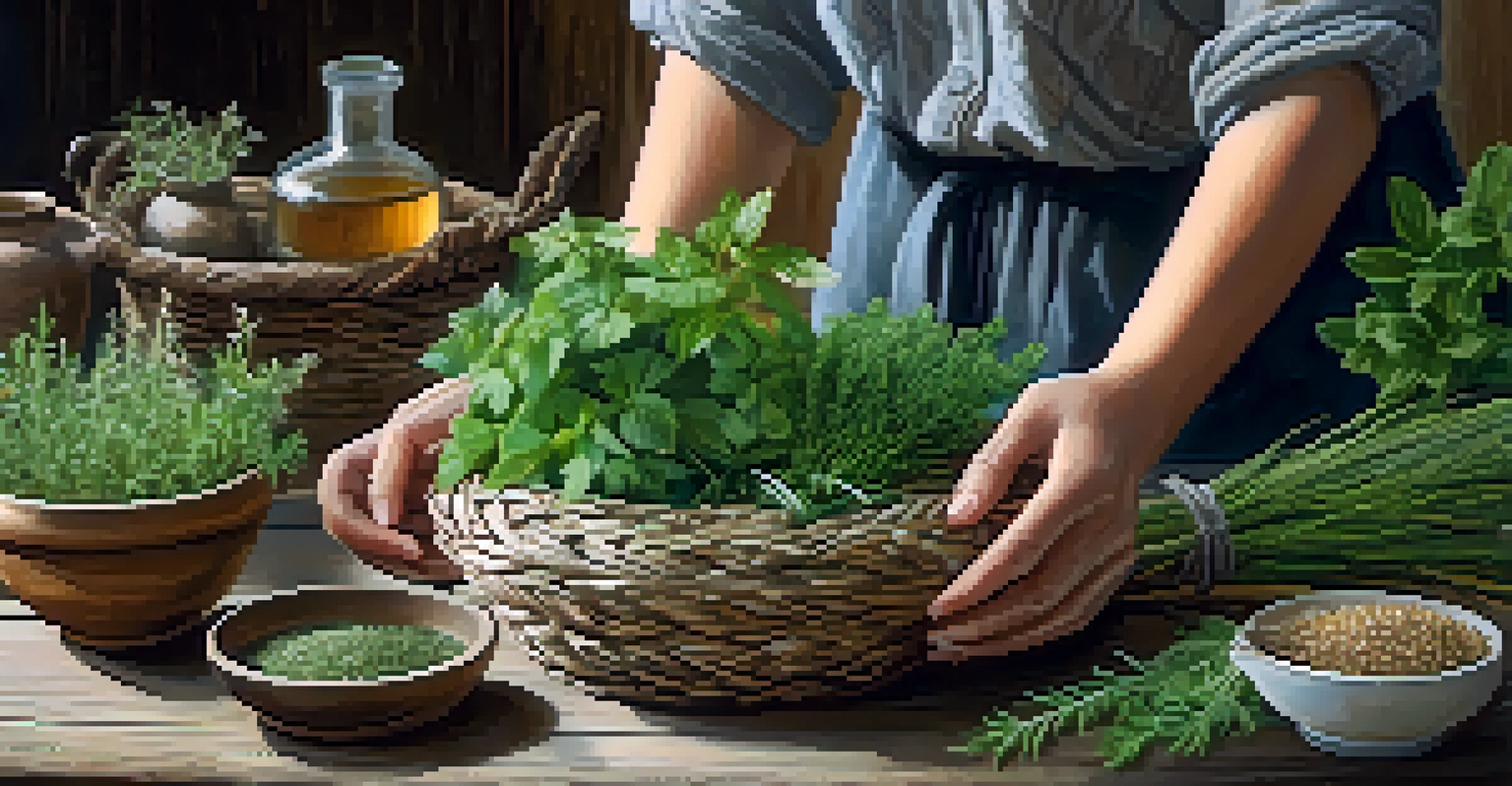The Spiritual Significance of Food in Indigenous Cultures

Food as a Sacred Offering in Indigenous Traditions
In many indigenous cultures, food is not just sustenance; it's a sacred offering. The act of preparing and sharing meals is often seen as a way to honor the earth and the spirits that inhabit it. This reverence transforms everyday meals into spiritual ceremonies that connect individuals to their ancestors and the natural world.
Food is the universal connector of all humanity. It creates bonds between people and cultures, fostering community and connection.
For instance, in Native American cultures, the corn plant is considered sacred. Its cultivation and consumption are intertwined with rituals that express gratitude to the Creator. This demonstrates how food can symbolize a deeper connection to cultural identity and spiritual beliefs.
Thus, food becomes a bridge between the physical and spiritual realms. It's a reminder that what we consume is a gift from the earth, deserving of respect and acknowledgment.
The Role of Food in Community and Identity
Food serves as a vital link in the tapestry of community life among indigenous peoples. Sharing meals fosters bonds and reinforces the sense of belonging. In many cultures, communal feasting is a way to celebrate significant events, reinforcing social ties and cultural identity.

Take, for example, the Inuit people, who rely on traditional hunting and fishing practices. Sharing the catch not only provides nourishment but also strengthens community ties and honors the land's gifts. This collective approach to food illustrates how meals are a means of preserving traditions and enhancing community cohesion.
Food as a Sacred Connection
In indigenous cultures, food serves as a sacred offering that honors the earth and fosters spiritual connections.
Ultimately, food is more than just a way to fill our stomachs; it embodies the spirit of togetherness and reinforces the values that define a community's identity.
Food as a Reflection of Spiritual Beliefs
In many indigenous cultures, the types of food consumed reflect deep spiritual beliefs. Certain foods are believed to possess healing properties, while others are considered spiritually significant. This relationship elevates food beyond mere nutrition to a source of spiritual sustenance.
The land is the source of life, and our food is a reflection of that life. To eat is to honor our ancestors and the earth.
For example, the use of herbs and plants in traditional healing practices highlights the interconnectedness of food and spirituality. The teachings of the land guide these practices, emphasizing respect for nature's bounty. This illustrates how food choices are intertwined with cultural narratives and spiritual teachings.
Thus, food becomes a medium through which spiritual beliefs are expressed and transmitted across generations, ensuring that cultural wisdom is preserved.
Seasonal Foods and Spiritual Cycles
Seasonal changes significantly impact the types of food consumed in indigenous cultures. The cycle of planting, harvesting, and fasting aligns closely with spiritual practices and rituals. This relationship emphasizes a harmony with nature, where food choices reflect the rhythm of the earth.
For instance, the agricultural practices of the Pueblo peoples involve a reverence for the changing seasons. They engage in ceremonies that celebrate planting and harvesting, reinforcing their connection to the land and its cycles. This cyclical approach to food consumption fosters a deeper appreciation for natural resources.
Community Bonds Through Sharing
Sharing meals in indigenous communities strengthens social ties and reinforces cultural identities.
Recognizing the spiritual significance of seasonal foods encourages mindfulness about what we eat and how it relates to the world around us.
Rituals and Ceremonies Surrounding Food
Rituals and ceremonies play a crucial role in how food is perceived spiritually within indigenous cultures. These practices often involve specific foods that carry symbolic meanings and are integral to various life events, such as births, marriages, and funerals. The rituals surrounding food elevate it to a sacred status.
For example, in many African indigenous cultures, the sharing of a meal during a ceremony is an act of unity and respect for ancestors. Each dish served may hold significance, representing blessings and communal values. This highlights how food rituals are woven into the fabric of cultural identity.
Through these celebrations, food becomes a vehicle for storytelling and the transmission of cultural values, reinforcing the spiritual bonds that tie communities together.
Food Sovereignty and Spiritual Connection
Food sovereignty is a powerful concept within indigenous cultures, emphasizing the right to access healthy and culturally appropriate food. This movement is not only about nutrition but also about reclaiming spiritual connections to traditional food sources. It reflects a desire to restore harmony with the land and ancestral practices.
For instance, many indigenous communities are revitalizing traditional farming techniques and foraging practices to reclaim their food systems. This effort not only enhances physical health but also reinvigorates spiritual ties to their heritage. It highlights how food sovereignty is intrinsically linked to identity and spirituality.
Reclaiming Food Sovereignty
Food sovereignty empowers indigenous peoples to reconnect with their traditional food practices and spiritual identities.
By advocating for food sovereignty, indigenous peoples are asserting their connection to the land and their right to maintain cultural practices. This movement empowers communities to nourish both body and spirit.
The Impact of Colonization on Food Spirituality
Colonization has dramatically impacted the food systems and spiritual practices of indigenous cultures. The introduction of foreign foods and agricultural practices disrupted traditional lifestyles and undermined spiritual connections to land-based foods. This shift often led to a disconnection from cultural identities and spiritual values.
Many indigenous communities are now working to reclaim their traditional foodways as a means of healing from the effects of colonization. By re-establishing connections to native crops and practices, they seek to restore not only their diets but also their cultural and spiritual identities.

This journey toward reclaiming food spirituality is an act of resistance and resilience, allowing indigenous peoples to honor their ancestors and nurture their communities in meaningful ways.